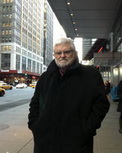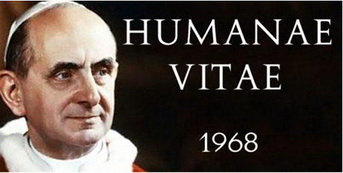 Chris
McDonnell, UK
Chris
McDonnell, UKchristymac733@gmail.com
 Chris
McDonnell, UK
Chris
McDonnell, UK
christymac733@gmail.com
Previous articles by Chris Comments
welcome here
July 18, 2018
Fifty
years on and still a disputed question

I only once remember the London Times offering a full broadsheet spread on its Letters page on one subject. It was in response to the encyclical of Paul VI on Contraception, known by its Latin opening, Humanae Vitae, 'Of Human life', issued on July 25th 1968.
If ever a statement from Rome created a crisis of conscience, it was this encyclical. I recall all too well its publication and the subsequent anguish it produced among so many, both priests and laity alike. Good pastors of their people were forced from ministry as a chasm of credibility opened in the Church, a painful scar which remains to this day. One friend responded to my question about his future actions with the brief statement, 'If I leave who will care for the people?' Ordained in 1954, he remained in ministry until his death last year.
There were those who saw no leeway in acceptance of its teaching then, nor do they see such an option to be available now; it was to become the litmus test of orthodoxy that demanded adherence.
Discussion of the issue of artificial birth control had been removed from the Council; instead a small Commission of six European non-theologians was established by John XXIII to evaluate the whole issue. Their meetings were limited, once in 1963 and twice in 1964. In the final weeks of the Council, Paul VI greatly extended membership and their final Report was completed in 1966. In it they proposed that artificial birth control was not intrinsically evil and that Catholic couples should be allowed to decide for themselves about the methods to be employed. This report was approved by 64 of the 69 members voting, a significant majority.
The final document of the Council, Gaudium et Spes, affirmed the duty of responsible parenthood yet, when it came to writing the Encyclical, Paul VI rejected the considered opinion of the Commission he established, with consequences for the Church that are all too evident today.
It is hard to argue the case for responsible conjugal love with those whose experience is, by and large, that of the celibate looking-on. Without the day by day responsibility of caring for a family, without experiencing the joy and attraction that first brought a couple together to exchange marriage vows, it is no small wonder that their perspective is limited.
In a recent survey reported on the web site of the Catholic Herald, nearly five hundred priests affirmed their adherence to the teaching of the encyclical. It was, I might suggest, a self-selecting group. If the same question were put to the laity, the result would be very different. But then as it is the Catholic family that is asked day by day to live with the consequences of this teaching, why bring them into the discussion?
Now we are witnessing a concerted attempt to represent arguments for acceptance of teaching that were not valid then and are still less so now, fifty years on. I wonder if every priest whose signature is included on that website were to offer their parishioners a voice, would our views be deemed of any significant value? Some who would dissent have already made their decision, evidenced by empty pews in so many churches. For others, the Church is our only home and an informed conscience our guide. We remain, in spite of the Encyclical, and will continue to be saddened by the consequences of the divisive teaching it offers. The fallacious argument that acceptance of the contraceptive pill leads to acceptance of abortion gets us nowhere, unless the means used for contraception are themselves abortive.
Responsible parenthood, lived through the experience of the Sacrament of Marriage, demands that love, one for another, extends to the care and well-being of children that are our blessing. This is not a numbers game but recognition that the needs of many require a realistic and compassionate view of family life.
So after fifty years, where do we now stand? Acceptance of Humanae Vitae is a matter that has worried the consciences of older Catholics since it was first promulgated; for our children and grandchildren it is a matter of little consequence. Their decision has been reached in the light of practice and is unlikely to change.
Their parents continue to follow their conscience hoping and praying, that in spite of apparent contradiction, they will be able to encourage their families to live their Christian faith within the community of our Church.
An appreciation of human sexuality and its loving expression through conjugal love must be open to our developing understanding of sexual attraction that is inherent in our being children of the God who made us.
END
====